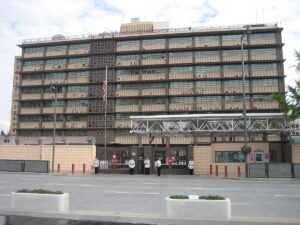US Student Visa Suspension: Embassy Shutdown, Harvard-Trump Conflict, and the Real Reason?
In May 2025, the Korean student community was thrown into chaos when the U.S. Embassy in Korea suddenly stopped accepting student visas. However, there are many aspects that are not clear-cut beyond a simple administrative procedure. It seems that all the threads are intertwined in this incident, including Trump’s foreign policy, the conflict with Harvard University, and the recent introduction of a rapidly changing AI-based screening system. This article will delve into the political and social implications behind the simple news of the visa suspension.
index
- 1. Suspension of student visas is not a simple administrative setback
- 2. Reactions of Korean students: Anger, fear, and helplessness
- 3. Harvard and Trump's long-standing conflict, and now
- 4. New Judging Criteria: AI, SNS, and Invasion of Privacy
- 5. A cross-section of international politics, not just a simple happening
1. Suspension of student visas is not a simple administrative setback
Last week of May 2025, U.S. Embassy in Koreasuddenly announced that it would stop accepting new applications and interview appointments for all international student visas (including F, M, and J visas). This came as a huge shock to not only the Korean international student community but also prospective students from other countries who plan to study in the U.S.
While some thought it was a server issue or a simple temporary delay, it was soon revealed that this was a global measure following a higher-level directive from the US State Department, and that the background was deeply influenced by domestic political trends and surveillance policies, rather than a simple technical issue.
In particular, as the visa review criteria have been strengthened to include 'applicant's social media monitoring', it has been revealed that embassies are reorganizing their systems in each country to analyze SNS activity history. This inevitably led to delays in visa review.
But is this simply a case of 'lack of digital documentation'? No. At the heart of the problem is the 'America First' policy that has accelerated since former President Donald Trump's return to power, and the conflict with educational institutions that oppose it.
This situation is not simply a problem of individual international students, but a new phenomenon that the United States is showing. Direction of immigration and education policyThis is also true.
2. Reactions of Korean students: Anger, fear, and helplessness
The American study abroad community in Seoul, Busan, Daejeon, and other places was thrown into turmoil by this measure. Students who had already received their university acceptance letters were preparing to leave for the summer, and many had already signed tens of millions of won worth of tuition and accommodation contracts.
Mr. Park (24), a student preparing to study abroad, expressed his feelings on social media, saying, “My life was stopped by a single word from the U.S. Embassy. I don’t even know what I did wrong, but they just told me to wait.”
The 'sudden shutdown' of the U.S. Embassy in Korea was not just an administrative mess, but also a real problem for many international students. life crisisIt meant.
Also, within the United States F-1 Visa As the validity and expiration of their I-20 documents approach, students are anxious, saying, “If I don’t get a visa, my admission itself may be canceled.”
3. Harvard and Trump's long-standing conflict, and now
To understand this situation more fundamentally, we need to look into the structure of the conflict between Donald Trump and America's top universities.
2020, Harvard, MIT sue Trump administration over student visa restrictionsAt the time, Trump proposed a policy of not allowing international students attending universities that were only offering online classes due to COVID-19 to remain in the country, which drew immediate backlash.
The lawsuit ultimately ended in victory for the university, but Trump has since identified “liberal elite universities” as his political enemies. Harvard University has been openly critical of Trump’s policies, and Trump has once again targeted the education sector since his re-election.
Trump, who started his re-election campaign in 2025, is again promising to “strengthen the screening of international students,” “monitor Chinese students,” and “adjust the ratio of international students in STEM.” There are concerns that Ivy League universities such as Harvard may face administrative pressure if they bypass or oppose these policies.
As a result, there is an interpretation that there is unspoken pressure at the embassy level, which is the visa issuing agency. This measure may not be a ‘technical issue’ but a ‘political message.’
4. New Judging Criteria: AI, SNS, and Invasion of Privacy
Meanwhile, another key reason for the suspension of this student visa review is the recent introduction of a new system by the U.S. Department of State and the Department of Homeland Security. AI-based risk analysis systemam.
The system automatically assesses “potential risks” by comprehensively analyzing the applicant’s name, country of origin, social media activity, and internet search history. In other words, it goes beyond the simple document screening of the past and tracks the applicant’s digital footprints.
Human rights groups in the U.S. criticize this as an “invasion of privacy through digital screening.” In particular, in countries with high Internet usage rates like Korea, there are concerns that most young people are likely to be affected by this AI filtering because they actively use SNS.
This has caused the embassy to take a long time to analyze each applicant's data to fit the new system, and in the process, visa applications themselves have been temporarily suspended.


5. A cross-section of international politics, not just a simple happening
In the end, this suspension of international student visas is not simply a problem of administrative system errors or IT failures. It is a 'complex phenomenon' that reflects the political, diplomatic, and security policies of the United States all at once, and international students are at the forefront of this.
Trump's return, the rekindling of the conflict with Harvard, the strengthening of AI systems, and the growing anti-immigrant sentiment in the US… all of these are incidents that have risen to the surface.
At this very moment, thousands of students dreaming of studying abroad in the United States are facing a new world called 'digital immigration screening'. And the question they face is not simply 'when' they will receive their visas, but how the United States will accept outsiders.
No one knows yet how long this measure will last and how this change will change the landscape of studying abroad in the United States. But what is clear is that we are in this moment. A place where the paradigm of immigration and education is changingThe point is that it is standing there.
summation:
-
The embassy's suspension of visa applications is not a simple system error.
-
International students are in a real crisis situation.
-
The conflict between Trump and Harvard still has repercussions.
-
The introduction of AI-based screening systems raises digital privacy concerns.
-
This is a complex phenomenon that intertwines U.S. immigration policy and international politics.
*Top 5 popular study abroad countries in English-speaking countries Go see

